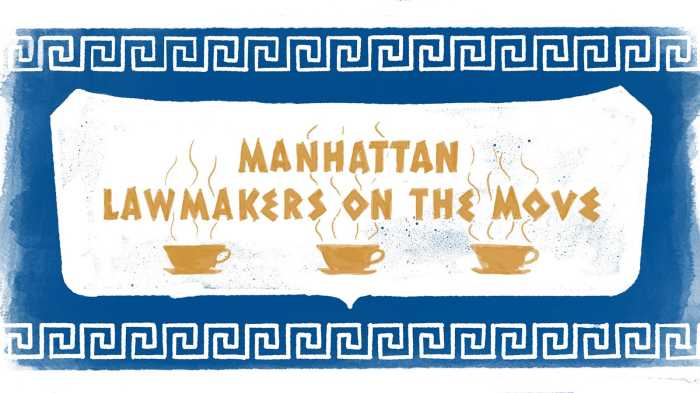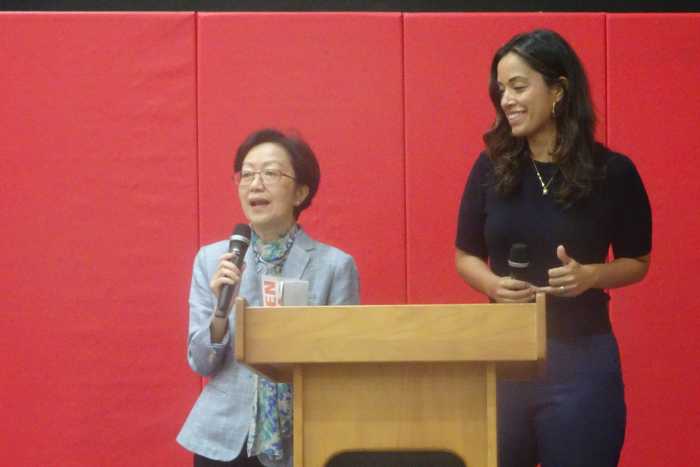Mayor Bill De Blasio (D) announced a new rezoning plan for the neighborhoods of SoHo and NoHo last Wednesday, sparking opposition and concern from other local electeds.
The plan will permit greater size and scale of new buildings and spaces, and its supporters argue that it will allow for more affordable housing in the neighborhood. However, its detractors insist that the claim is a ruse, saying that it will allow luxury high rises and chain stores to take over the neighborhood at the expense of the local culture. Their suspicion is, in part, fueled by the fact that real estate developer Edison Properties lobbied De Blasio for the plan.
“A small percentage of the new buildings that would be built would have to include some fraction of affordable housing in them. We and others in the neighborhood would welcome affordable housing and to require it in new development. What we don’t welcome these massive upzonings which are just huge giveaways to private developers and which aren’t necessary at all,” explained Andrew Berman, Executive Director of Village Preservation.
Spokespeople from Edison Properties declined to respond for comment.
Assemblymember Deborah Glick (D-Greenwich Village, East Village, West Village) agreed with Berman that the rezoning plan was a threat to the neighborhood. “Our goal has always been to ensure stable and affordable housing to all New Yorkers. Preserving existing units and building in available lots as permitted should be this city’s priority as it is in other cities,” she said.

“The notion that rezoning to allow luxury private developers to serve as the economic vehicle for affordable housing development has proved disappointing and is questionable in a downturned market. Furthermore, these rezonings that are really dramatic upzonings, which runs contrary to environmental concerns, especially during a time that the City needs to focus on climate resiliency efforts.”
Senator Brad Hoylman (D-Greenwich Village, East Village, Chelsea), was less eager to dismiss the plan, but lacked optimism about it. “This is an incredibly important, once-in-a-generation project, so I hope the de Blasio Administration has learned from its past mistakes with rezonings and engages seriously with local stakeholders and community boards as it proceeds,” he said.

Meanwhile, Manhattan Borough President Gale Brewer (D) expressed concerns about the plan in a recent newsletter, but indicated she would have to look at it before deciding her stance. “SoHo’s roots as a hotbed of the arts has attracted so much commercial development over recent years that commerce now far overshadows those roots, and artists have been increasingly priced out. I’d like to see some form of rezoning that allows for that artistic legacy to continue,” she said.

“I’ve supported and opposed rezonings in other parts of Manhattan (though I’ve never taken a position on rezonings in other boroughs). I strongly support affordable housing; but the administration’s admirable drive to create more of it has all too frequently run roughshod over communities and the planning process.”
As the debate goes on, City Councilmembers have begun debating the merits of the plan. A spokesperson for Council Speaker Corey Johnson (D-Chelsea, Hell’s Kitchen) told New York County Politics that he was working closely with Councilmember Margaret Chin (D-Battery Park City, Chinatown) to evaluate it. “Speaker Johnson looks forward to reviewing this proposal in more detail as the rezoning process moves forward,” they said.

Meanwhile, Chin told this reporter that the review was already underway.
“I have always prioritized the creation of deeply affordable housing, especially in neighborhoods where it is scarce or entirely absent,” said Chin. “I will work closely with residents, stakeholders, and the Administration to preserve the historical and cultural components of SoHo and NoHo while making the most of this opportunity to create affordable housing for New Yorkers.”

Despite concern and hostility to the plan, those involved are open to another, better one for SoHo and NoHo.
“We would never say that the zoning as it exists now is absolutely perfect or sacrosanct. There’s definitely things that could be changed or adjusted,” explained Berman. “If the city was really interested in engaging in a conversation with us and other residents about ways that the zoning could be adjusted to make a better neighborhood in a better city, we’d be happy to have that conversation.”








